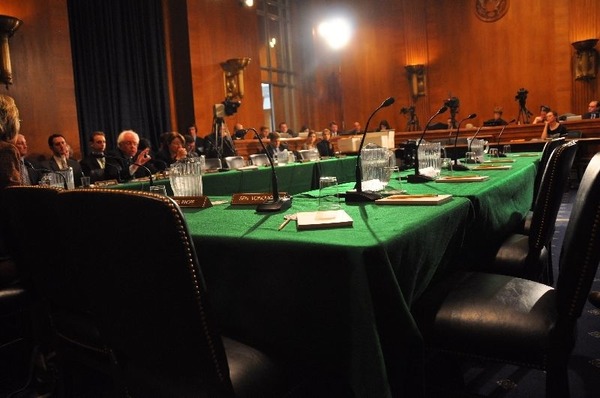Most of the big environmental groups are cheering the advancement of climate legislation out of the Environment and Public Works Committee on Thursday, but the farther-left environmental groups are still not happy with the bill.
Laudatory responses came almost immediately from Sierra Club, National Wildlife Federation, Environmental Defense Fund, and the Natural Resources Defense Council, to name a few. But Friends of the Earth—which along with Greenpeace was the only major green group to oppose the House climate legislation—blasted the bill as “a woefully disproportionate response to the tremendous economic, security and public health threats posed by global warming.”
“It is extremely disconcerting to hear scientists speak about the level of action needed to prevent radical and dangerous climate destabilization, and then to see how far short even one of the most environmentally friendly committees in Congress has fallen,” said Friends of the Earth President Erich Pica in a statement.
While some portions of the bill have been improved over the House bill, Friends of the Earth identified a number of concerns: “a poorly regulated carbon trading scheme,” an allocation system that “showers polluting corporations with billions of dollars” without requiring stringent carbon reductions, and “massive carbon offset loophole.”
“These flaws are unacceptable, and they are the result of a defective political system in which polluting corporations, Wall Street traders, and their lobbyists continue to exert far too much influence,” Pica’s statement said. And Pica said the negotiating effort by John Kerry (D-Mass.), Lindsey Graham (R-S.C.) and Joe Lieberman (I-Conn.) appeared “to be moving forward with an attempt to produce an even weaker bill—one friendlier to the oil, coal and nuclear industries.”
Greenpeace is also staking out a position against the bill, arguing that it’s nowhere near what the current science demands, or what the international community expects. “The fact that the EPW committee passed it out doesn’t change the fact that the bill is totally inadequate for solving the problem,” said Greenpeace spokesman Joe Smyth.
Along with Friends of the Earth, they see themselves as holding the line on climate policy that reflects the science, rather than political expediency. “We feel like it’s our role to ensure that any legislation that comes through is consistent with the science and what it’s going to take to address the issue and move the international process,” said Smyth.
Some have wondered whether the lack of unity among environmental groups will be an impetus to passing legislation. But, if anything, having a few groups staked out to the left is likely more helpful to the goal of moving some manner of legislation this year, as it gives moderates cover to say that the legislation really isn’t all that aggressive after all.
Obama indicated as much after the House bill, telling reporters, “[T]he final legislation that emerges is probably not going to satisfy the Europeans or Greenpeace. On the other hand, I think that when you’ve got corporate leaders like Jeff Immelt, legislators from coal regions like Rick Boucher, and Al Gore all agreeing that this is worth doing, that’s a pretty good coalition to work with.”











